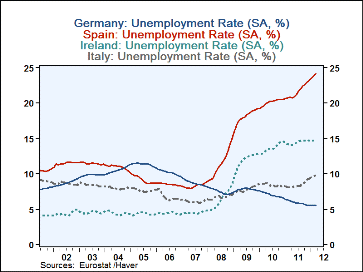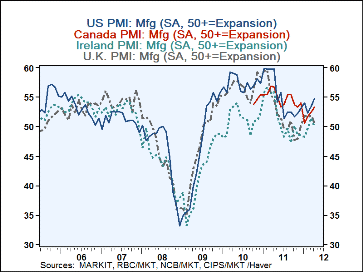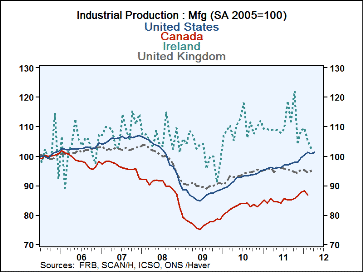 Global| May 21 2012
Global| May 21 2012Pay Raises for German Workers
Summary
The I.G. Metall union and employers agreed to a 4.3% pay rise, a compromise between the union's demand of a 6.5% raise and management's offer of a 2.6% raise. It was also the largest pay rise since the 5.4% negotiated, twenty years [...]
 The I.G. Metall union and employers agreed to a 4.3% pay rise, a
compromise between the union's demand of a 6.5% raise and management's
offer of a 2.6% raise. It was also the largest pay rise since the
5.4% negotiated, twenty years ago in 1992. Continued high employment
and declining unemployment strengthened the hand of the union. The
decline in the unemployment rate to 5.6% in Germany, in contrast to the
rising trend in other Euro Area countries is illustrated in the first
chart. Even the finance minister, Wolfgang Schauble, recently
exhorted employers to increase wages to make up for the restraint of the
past decade. In addition to the 3.6 million I. G. Metall workers, 2
million public sector workers recently negotiated a 6,3 % pay increase
over 24 months. In all, it is estimated that the wages of some
9 million workers or about 22% of those employed are up for negotiations
this year.
The I.G. Metall union and employers agreed to a 4.3% pay rise, a
compromise between the union's demand of a 6.5% raise and management's
offer of a 2.6% raise. It was also the largest pay rise since the
5.4% negotiated, twenty years ago in 1992. Continued high employment
and declining unemployment strengthened the hand of the union. The
decline in the unemployment rate to 5.6% in Germany, in contrast to the
rising trend in other Euro Area countries is illustrated in the first
chart. Even the finance minister, Wolfgang Schauble, recently
exhorted employers to increase wages to make up for the restraint of the
past decade. In addition to the 3.6 million I. G. Metall workers, 2
million public sector workers recently negotiated a 6,3 % pay increase
over 24 months. In all, it is estimated that the wages of some
9 million workers or about 22% of those employed are up for negotiations
this year.
This looks like a substantial increase in money in the pockets of German workers this year. It could lead to higher consumption not only of domestic goods in Germany, but also of imports from other countries. A small, but positive bright spot for the troubled Euro Area.
| Unemployment Rates | Mar'12 | Feb'12 | Jan'12 | Dec'11 | Nov'11 | Oct'11 | Sep'11 |
|---|---|---|---|---|---|---|---|
| Germany | 5.6 | 5.6 | 5.6 | 5.6 | 5.6 | 5.7 | 5.8 |
| Spain | 24.1 | 23.8 | 23.5 | 23.2 | 23.0 | 22.7 | 22.4 |
| Ireland | 14.5 | 14.7 | 14.7 | 14.7 | 14.8 | 14.7 | 14.7 |
| Italy | 9.8 | 9.6 | 9.5 | 9.3 | 6.2 | 8.8 | 8.7 |
More Economy in Brief
 Global| Feb 05 2026
Global| Feb 05 2026Charts of the Week: Balanced Policy, Resilient Data and AI Narratives
by:Andrew Cates







